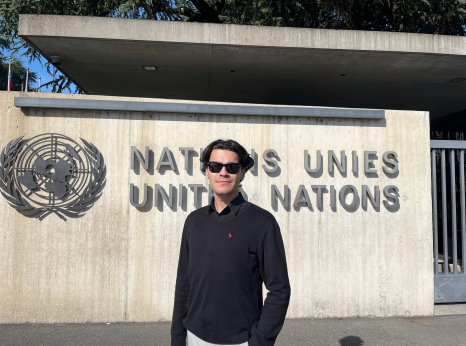Türkiye: Release Arbitrarily Imprisoned Activist

Enes Hocaoğulları is a 23-year-old human rights defender and LGBTI+ rights activist. In February, he was selected as a youth delegate from Türkiye to the 48th session of the Congress of Local and Regional Authorities in Strasbourg. In a speech he made on 27 March, he referred to the crackdown on mass protests that had taken place in the preceding week, following the detention and imprisonment of Istanbul Mayor Ekrem İmamoğlu.
Enes Hocaoğulları was detained on 5 August at the Ankara Esenboğa Airport and remanded in pre-trial detention the same day. He is accused of ‘publicly disseminating misleading information’ under Article 217/A of the Turkish penal code, an offence carrying a prison sentence of one to three years. He also faces an additional baseless charge of ‘inciting the public to hatred and enmity’ under Article 216/1 of the penal code, which carries the same penalty. If convicted on both charges, Enes Hocaoğulları could face between two to six years in prison solely for exercising his right to freedom of expression.
The indictment against Enes Hocaoğulları cites excerpts from his speech, including: “I was there from day one; I was there when police forces used disproportionate brutality towards us including pepper spray, plastic bullets and water cannons. I was there when my peers were detained and went through strip searches” and “I was fighting for democracy in the streets last week… the youth has had enough, we have had enough and we are ready to go on the streets to regain our freedoms.” These remarks are presented as evidence of wrongdoing on the ground that they ‘’caused a reaction and complaints on social media where users tagged the General Security Directorate and the Ministry of Justice.’’
With its overly broad and vague wording and its arbitrary use particularly targeting journalists since its introduction in 2022, Article 217/A of the penal code is incompatible with Türkiye’s human rights obligation to protect the right to freedom of expression. Further, Article 216/1 is broadly defined and far wider than the permissible limitations to the right to freedom of expression found in international law. Amnesty International has called on Türkiye to repeal Article 217/A and ensure that all laws regulating the right to freedom of expression, including those intended to address disinformation, are brought in line with Türkiye’s obligations under international law. The organization has long called for Article 216/1 to be amended to ensure that it is only used to prohibit advocacy of hatred amounting to violence or discrimination in line with requirements found within international human rights standards.
Under international human rights law and standards, the state has the ultimate responsibility to protect and promote human rights and consequently, protect human rights defenders who highlight human rights violations. States have the duty to prevent human rights violations and abuses committed against human rights defenders and related to their work as Human Rights Defenders, and to ensure that they can carry out their work in a safe and enabling environment.